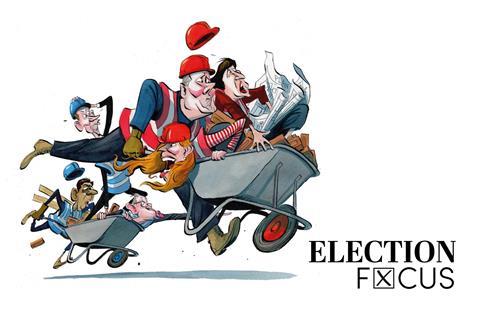With the general election looming, it is worth reflecting on what is required to deliver the best outcomes within our industry, writes Paul Beeston of RLB
As the country gets ready to elect a new government, it occurred to me as a professional advising clients on the best solutions aligned to the latest policy and practice that the differences between good governments and good governance can be a narrow one, both when it comes to our industry and our projects.

Without wading into the politics, governments are the formal, top-down imposition of rule and laws. In the case of our parliamentary system, governments quite often rely on the authority that comes with a clear majority to exert power and get things done.
Governance recognises that power may be dispersed and that acceptance of decisions, and indeed better decision-making, may need wider participation. Governments of all persuasions – in their drive for power – are capable of becoming detached from the beneficiaries of their policy and action.
We need the jolt of an outsider’s perspective to remind us that our status quo may be kindly described as eccentric
Projects sometimes operate in a similar way to governments. There may be a dominant client relationship that exerts power over other participants in the process. Indeed, the power may be concentrated in a single or small group of individuals with particular goals that may not be aligned with the wider organisation. Good project governance will result in projects achieving better outcomes.
I have recently spent some time explaining our industry to those outside of it. I encourage everyone to do this from time to time as it reminds us of the many inconsistencies of the industry that we take for granted.
We need the jolt of an outsider’s perspective to remind us that our status quo may be kindly described as eccentric. In my case, that jolt came from speaking to some overseas investors and some in the tech sector within the space of a week. Those conversations reminded me that our industry is as fragmented as it is diverse.
Rather than fixing our differences, we should embrace them
Rather than trying to “fix” those differences, we should embrace them. They provide us with varied and exciting challenges and the need for creativity and innovation. But too often we all (individually or in our collective subconscious) have a default modus operandi.
If we think to look up from our default ways of working, our industry has kindly provided a plethora of toolkits and playbooks that extol best practice. They all contain great information. However, many are presented as the panacea for all. Can they really all be the right approach to every project on every occasion?
Good governance can act as the guard rail to remind us of what the project objectives are and to “try on” a different perspective. Diversity of thought can help here, which can be in short supply in an industry still working on looking less homogonous.
At its heart, project governance is about assurance
So, what can good project governance deliver and how can it achieve those aims? At its heart, project governance is about assurance. It provides assurance that a project will succeed against its objectives.
So, governance aims to deliver better outcomes, and how it does that cannot be to blindly follow the latest playbook or toolkit without understanding context. In a world categorised by volatility, uncertainty, complexity and ambiguity, the context is at its most critical.
Follow the playbook when it provides the best solution and embrace innovation when it may not have all of the answers
We should all embrace diversity of thought, try on some different perspectives and shun the comfortable path to habitual ways of working. We should consider which stakeholders we are representing and those beneficiaries who are relying on the outcomes of our projects. Follow the playbook when it provides the best solution and embrace innovation when it may not have all of the answers.
We all need an eye on the correct time horizons and what outcomes are being sought over each of them. The outcomes of the design stage may be different to the outcomes at practical completion, or over the whole operational life of an asset. Concurrently achieving success against each time horizon is difficult – they are different skillsets and require those different perspectives that a governance process can provide.
Finally, as the news cycles remind us, governments have a defined term, while project governance should be put in place for the life of an asset. It may need to be agile and change over time, but our built environment is in need of effective management across every stage of the cycle.
Paul Beeston is a partner at RLB
Election focus

With the general election fast approaching, the UK is facing some serious problems.
Low growth, flatlining productivity, question marks over net zero funding and capability, skills shortages and a worsening housing crisis all amount to a daunting in-tray for the next government.
This election therefore comes with very high stakes for the built environment and the economy as a whole.
�ڶ�����’s coverage aims to help the industry understand the issues and amplify construction’s voice so that the parties hear it loud and clear.



























No comments yet